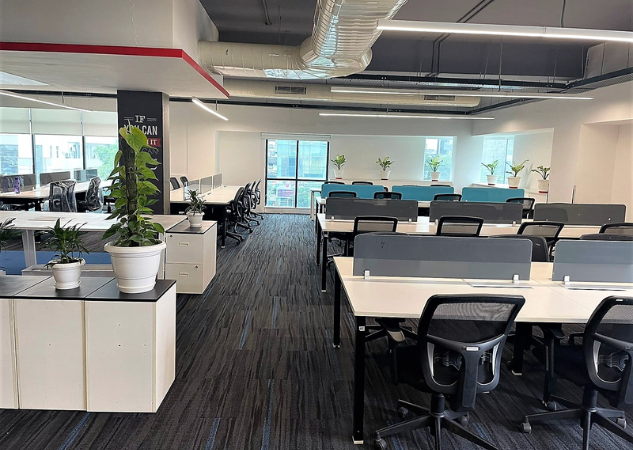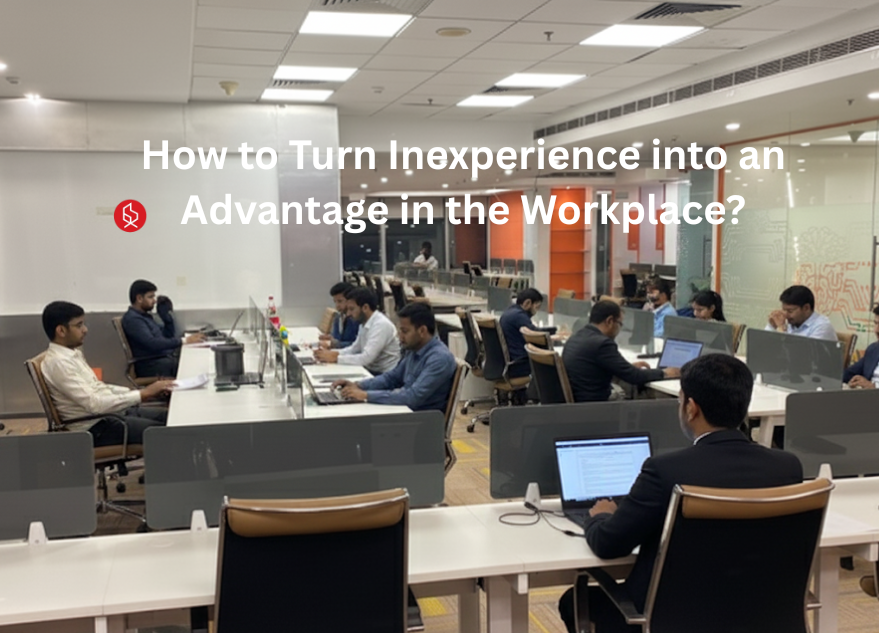Many professionals worry that a lack of experience may hold them back, but in reality, inexperience can often be turned into a strength. By approaching challenges with fresh perspectives, curiosity, and adaptability, you can convert what seems like a weakness into a powerful career advantage.
💡 Are you looking for Coworking space in Gurgaon, Noida or Delhi? We are just a call away. Call Now: 08999 828282
10 Ways to Turn Inexperience into a Workplace Advantage
- Embrace the Power of a Fresh Perspective
- Learn Faster Through Curiosity
- Build Strong Relationships Through Humility
- Use Adaptability to Stand Out
- Take Calculated Risks with Confidence
- Rely on Transferable Skills
- Show Willingness to Learn from Feedback
- Showcase Enthusiasm and Energy
- Find Opportunities Others Overlook
- Leverage Technology and Digital Skills
1. Embrace the Power of a Fresh Perspective
Inexperience means you’re not weighed down by years of “this is how it’s always been done.” Employers often value fresh perspectives because they can lead to innovative ideas and new ways of solving problems. As a newcomer, you can ask questions others might overlook and suggest approaches that challenge outdated practices. Use your outsider’s mindset to spot inefficiencies and recommend creative improvements. Instead of worrying about what you don’t know, focus on how your unbiased outlook can contribute positively to your workplace. This mindset makes you stand out as someone who brings energy and originality to the team.

2. Learn Faster Through Curiosity
Inexperienced professionals often compensate with curiosity and eagerness to learn. By actively asking questions, seeking mentorship, and taking notes, you demonstrate enthusiasm for growth. Managers appreciate employees who show initiative in learning instead of pretending to know everything. Curiosity also helps you adapt to new technologies and industry trends more quickly than experienced professionals who may resist change. Treat your workplace as a classroom where every meeting, project, and feedback session is a chance to grow. By approaching each challenge with genuine curiosity, you’ll gain knowledge faster and prove that your inexperience is not a limitation but a strength.
3. Build Strong Relationships Through Humility
One advantage of inexperience is the ability to approach others with humility and openness. Unlike seasoned professionals who may hesitate to ask for help, newcomers can naturally seek guidance without appearing weak. This creates opportunities to build meaningful relationships with mentors, peers, and managers. A humble attitude shows that you value teamwork and collaboration, which are highly regarded workplace skills. When you combine humility with a willingness to contribute, you become approachable and trustworthy. Over time, these strong professional relationships will open doors for learning, growth, and career advancement, turning inexperience into a valuable networking advantage.
Also Read: 10 Workplace Safety Tips Every Employee Should Know
4. Use Adaptability to Stand Out
Inexperience often makes you more adaptable because you’re not tied to old habits. Employers love employees who can adjust quickly to new tools, policies, or strategies. For example, when your team adopts new software, your lack of rigid habits may allow you to master it faster. Adaptability also helps you thrive in fast-changing industries like technology, marketing, or entrepreneurship. Instead of viewing your lack of experience as a roadblock, treat it as an opportunity to learn without unlearning. This ability to adapt sets you apart from others who may struggle to break free from established routines.
5. Take Calculated Risks with Confidence
Experienced professionals may avoid risks because they’re focused on maintaining their reputation. As someone with less experience, you have the freedom to try bold ideas and experiment without the fear of “failing” by traditional standards. This doesn’t mean being reckless—it means using research, creativity, and a willingness to test new methods. Taking calculated risks demonstrates confidence and innovation, qualities employers admire. Even if an idea doesn’t succeed, you’ll gain valuable lessons and resilience. Over time, this fearless mindset can lead to breakthroughs that experienced colleagues may hesitate to attempt, turning your inexperience into a leadership quality.
6. Rely on Transferable Skills
Even if you’re new to a specific role or industry, you likely have transferable skills that can make a big impact. Skills like communication, problem-solving, critical thinking, and time management are valuable in any workplace. Highlighting these strengths can balance your lack of technical experience. For instance, being a great communicator can help you coordinate projects, while problem-solving skills allow you to find creative solutions. Recognizing and leveraging these abilities proves you already have a foundation to contribute meaningfully. In many cases, employers value soft skills as much as technical expertise, giving you an edge despite limited experience.
7. Show Willingness to Learn from Feedback
Inexperience often comes with mistakes, but these mistakes can become steppingstones if you embrace feedback. Many professionals struggle with criticism, but newcomers can turn it into a tool for growth. By showing openness to constructive feedback, you signal maturity, adaptability, and eagerness to improve. Employers value employees who don’t repeat mistakes but instead learn from them quickly. Actively asking for feedback also demonstrates self-awareness and initiative. When you implement feedback effectively, it builds trust and shows your colleagues that you are capable of growing into your role, proving that inexperience is not a disadvantage.
8. Showcase Enthusiasm and Energy
One of the biggest advantages inexperienced professionals bring to the workplace is enthusiasm. Unlike seasoned employees who may feel stuck in routine, newcomers often bring fresh energy to projects. This enthusiasm can motivate team members, improve morale, and create a positive work environment. Employers are drawn to employees who display genuine excitement about their roles and responsibilities. By consistently showing energy and passion, you make yourself memorable and indispensable. In many cases, enthusiasm can outweigh years of experience because it drives productivity, creativity, and collaboration within the workplace.
💡 Are you looking for Coworking space in Gurgaon, Noida or Delhi? We are just a call away. Call Now: 08999 828282
9. Find Opportunities Others Overlook
With a beginner’s mindset, you’re more likely to notice opportunities that experienced professionals might ignore. Because you’re not constrained by the “usual way” of doing things, you can identify new methods, tools, or collaborations. For example, you might spot inefficiencies in workflows or propose innovative ideas that streamline processes. This ability to uncover overlooked opportunities makes you valuable to any team. By consistently seeking ways to improve your environment, you prove that your inexperience is actually an advantage it allows you to see the bigger picture differently and bring fresh solutions to workplace challenges.
10. Leverage Technology and Digital Skills
Younger or less experienced professionals often have an edge in digital fluency. From navigating productivity apps to leveraging social media for business, your comfort with technology can be a major asset. Many organizations struggle with digital transformation because older systems and habits dominate. By applying your tech-savviness, you can help streamline operations, improve communication, or introduce innovative tools. Even basic skills like using collaboration platforms or data visualization tools can set you apart. Turning your familiarity with technology into workplace contributions proves that inexperience doesn’t mean inefficiency—it can make you the go-to person for digital solutions.
Turning inexperience into an advantage is all about curiosity, adaptability, and a willingness to learn. Embrace challenges, seek mentorship, and leverage your fresh perspective to stand out. For professionals looking to grow, The Office Pass (TOP) offers collaborative coworking spaces that boost learning, networking, and productivity. Connect with like-minded individuals and transform your career journey today. To explore more, contact The Office Pass (TOP) at 8999 828282 and start making the most of every opportunity!
Frequently Asked Questions (FAQs)
Question: How can I explain my lack of experience in a job interview?
Answer: Be honest and focus on your strengths. Highlight transferable skills, your eagerness to learn, and specific examples where you quickly adapted or solved problems. Employers often value enthusiasm, curiosity, and growth potential as much as direct experience.
Question: What skills should I highlight if I don’t have much experience?
Answer: Emphasize soft skills like communication, adaptability, problem-solving, and teamwork. These are universal skills that apply to any role. Pair them with a willingness to learn new technical skills, and you’ll show you can quickly grow into the position.
Question: Can enthusiasm really make up for inexperience?
Answer: Yes, enthusiasm can be a strong differentiator. Employers appreciate employees who bring positive energy and motivation to the team. Enthusiasm shows you’re engaged, committed, and ready to take on challenges, which can often outweigh limited experience.
Question: How do I gain confidence when I feel inexperienced?
Answer: Start by acknowledging your strengths and focusing on what you bring to the table. Prepare by learning as much as possible, seek mentorship, and remind yourself that everyone starts somewhere. Confidence grows as you gain knowledge and take small wins.
Question: Why do companies hire inexperienced candidates?
Answer: Companies hire fresh talent because they bring new perspectives, adaptability, and enthusiasm. Inexperienced employees are often quicker to learn new systems and less resistant to change, making them valuable for evolving workplaces.
Question: How do I turn mistakes into advantages at work?
Treat mistakes as learning opportunities. Own them honestly, ask for feedback, and implement improvements. This shows resilience, accountability, and growth. Over time, your ability to learn from errors becomes an asset rather than a weakness.
Question: What industries value inexperience the most?
Answer: Startups, tech, marketing, and creative industries often value inexperience because they thrive on fresh ideas and innovation. These environments reward adaptability and enthusiasm, making them ideal for professionals with less traditional experience.
Question: How can I make up for lack of technical skills?
Answer: Enroll in online courses, attend workshops, or practice self-learning through free resources. At work, ask for opportunities to shadow colleagues or take on small projects. Showing initiative to close skill gaps proves you’re proactive and dedicated.
Question: Is networking still important if I’m inexperienced?
Answer: Absolutely. Networking allows you to connect with mentors, peers, and industry leaders who can guide and support your growth. Building genuine relationships can open opportunities that experience alone cannot, making networking essential for career success.
Question: How do I stay motivated when inexperience feels overwhelming?
Answer: Remind yourself that every expert once started as a beginner. Break tasks into smaller goals, celebrate progress, and seek feedback regularly. Staying curious and focusing on learning will keep you motivated, even when challenges feel tough.



